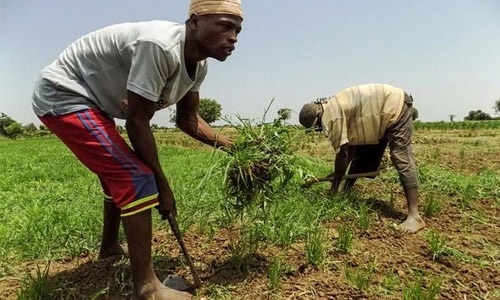Nigeria looks to 'white gold' for economic recovery
Kano : Hamisu Haruna and his men are bent over, turning the earth under a relentless sun. The work is hard in this impoverished part of northern Nigeria but the harvest will be good.
"In the last two years my yield has jumped to 35 bags of rice against the 20 I was getting in previous years," Haruna, who is in his 40s with craggy features and a wooden hoe over his shoulder.
"Rice farming has greatly improved. I have had better yield and better price in the market," he told AFP at his farm at Dawakin Tofa, on the outskirts of Kano.
Rising rice production is one of the few positives of Nigeria's recession, which is the west African country's worst in 25 years.
Today about 5.7 million tonnes of rice being are produced every year -- three times as much as a decade ago.
"We are now living a white gold revolution," said Francis Nwilene, the Nigeria director of the AfricaRice research centre.
"People understand that oil is not something Nigeria can depend on anymore."
The potential is undeniable. But despite having vast tracts of fertile land, Nigeria -- the largest consumer of rice in Africa -- is also one of the world's biggest importers of the food staple.
In the Kano region, the GreenPro factory shifted from specialising in flour and poultry to white cereals four years ago.
"Rice processing is by far more profitable than flour and chicken feed," said production manager Salisu Saleh.
"Rice is a major food staple in our society which only few can live without."
In a sign of rice's paramount role in Nigerian society, a "Jollof price index" -- named after a popular savoury fried rice dish -- was launched by an advisory firm in June to measure food inflation.
Related Posts

